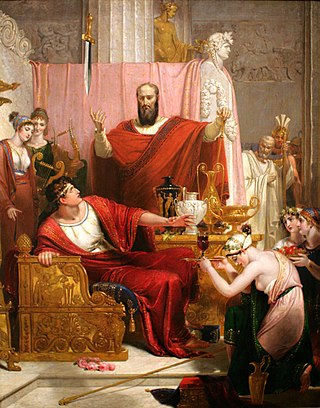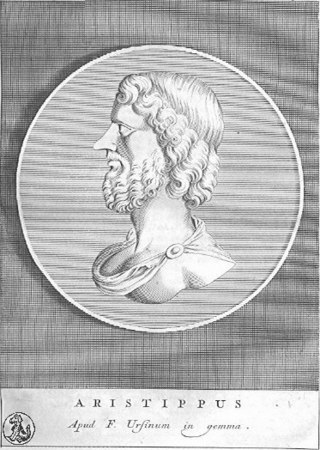
Syracuse is a historic city on the Italian island of Sicily, the capital of the Italian province of Syracuse. The city is notable for its rich Greek and Roman history, culture, amphitheatres, architecture, and as the birthplace and home of the pre-eminent mathematician and engineer Archimedes. This 2,700-year-old city played a key role in ancient times, when it was one of the major powers of the Mediterranean world. Syracuse is located in the southeast corner of the island of Sicily, next to the Gulf of Syracuse beside the Ionian Sea. It is situated in a drastic rise of land with 2,000 metres (6,600 ft) depths being close to the city offshore although the city itself is generally not so hilly in comparison.
This article concerns the period 349 BC – 340 BC.

Damocles is a character who appears in a anecdote commonly referred to as "the sword of Damocles", an allusion to the imminent and ever-present peril faced by those in positions of power. Damocles was a courtier in the court of Dionysius I of Syracuse, a ruler of Syracuse, Sicily, Magna Graecia, during the classical Greek era.
Year 367 BC was a year of the pre-Julian Roman calendar. At the time, it was known as the Year of the Tribunate of Cossus, Maluginensis, Macerinus, Capitolinus, Cicurinus and Poplicola. The denomination 367 BC for this year has been used since the early medieval period, when the Anno Domini calendar era became the prevalent method in Europe for naming years.

Dionysius I or Dionysius the Elder was a Greek tyrant of Syracuse, Sicily. He conquered several cities in Sicily and southern Italy, opposed Carthage's influence in Sicily and made Syracuse the most powerful of the Western Greek colonies. He was regarded by the ancients as the worst kind of despot: cruel, suspicious, and vindictive.

Polonius is a character in William Shakespeare's play Hamlet. He is the chief counsellor of the play's ultimate villain, Claudius, and the father of Laertes and Ophelia. Generally regarded as wrong in every judgment he makes over the course of the play, Polonius is described by William Hazlitt as a "sincere" father, but also "a busy-body, [who] is accordingly officious, garrulous, and impertinent". In Act II, Hamlet refers to Polonius as a "tedious old fool" and taunts him as a latter day "Jephtha".

The Cyrenaics or Kyrenaics, were a sensual hedonist Greek school of philosophy founded in the 4th century BCE, supposedly by Aristippus of Cyrene, although many of the principles of the school are believed to have been formalized by his grandson of the same name, Aristippus the Younger. The school was so called after Cyrene, the birthplace of Aristippus. It was one of the earliest Socratic schools. The Cyrenaics taught that the only intrinsic good is pleasure, which meant not just the absence of pain, but positively enjoyable sensations. Of these, momentary pleasures, especially physical ones, are stronger than those of anticipation or memory. Further, they recognized the value of social obligation and that pleasure could be gained from altruistic behaviour. The school died out within a century and was replaced by the philosophy of Epicureanism.
The story of Damon and Pythias is a legend in Greek historic writings illustrating the Pythagorean ideal of friendship. Pythias is accused of and charged with plotting against the tyrannical Dionysius I of Syracuse. Pythias requests of Dionysius to be allowed to settle his affairs. Dionysius agrees, on the condition that Pythias' friend, Damon, be held hostage and, should Pythias not return, be executed in his stead. When Pythias returns, Dionysius, amazed by the love and trust in their friendship, frees them both.
Dionysius the Younger, or Dionysius II, was a Greek politician who ruled Syracuse, Sicily from 367 BC to 357 BC and again from 346 BC to 344 BC.
Richard Edwardes was an English poet, playwright, and composer; he was made a Gentleman of the Chapel Royal, and was master of the singing boys. He was known for his comedies and interludes. He was also rumoured to be an illegitimate son of Henry VIII.
Eubulus was an Athenian Middle Comedy poet, victorious six times at the Lenaia, first probably in the late 370s or 360s BC

"All the world's a stage" is the phrase that begins a monologue from William Shakespeare's pastoral comedy As You Like It, spoken by the melancholy Jaques in Act II Scene VII Line 139. The speech compares the world to a stage and life to a play and catalogues the seven stages of a man's life, sometimes referred to as the seven ages of man.

"The Pledge" is a ballad published by the German poet Friedrich Schiller in his 1799 Musen-Almanach. He took the idea out of the ancient legend of Damon and Pythias issuing from the Latin Fabulae by Gaius Julius Hyginus, as rendered in the medieval collection of the Gesta Romanorum. It magnifies the belief in fidelity and loving friendship, and remains today one of the most famous German poems.
Hermias of Atarneus was a Greek tyrant of Atarneus, and Aristotle's father-in-law.

The Shakespearean fool is a recurring character type in the works of William Shakespeare.
This page is a list of topics in ancient philosophy.
Theodorus "the Atheist", of Cyrene, was a Greek philosopher of the Cyrenaic school. He lived in both Greece and Alexandria, before ending his days in his native city of Cyrene. As a Cyrenaic philosopher, he taught that the goal of life was to obtain joy and avoid grief, and that the former resulted from knowledge, and the latter from ignorance. However, his principal claim to fame was his alleged atheism. He was usually designated by ancient writers ho atheos, "the atheist."

Il tiranno di Siracusa is a 1962 Italian/American film directed by Curtis Bernhardt. The film is based on the Greek legend of Damon and Pythias, and set during the reign of Dionysius I of Syracuse.











